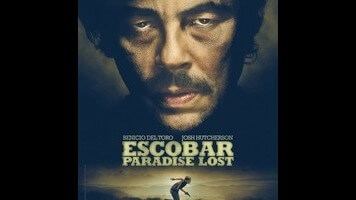So, here’s the hook. It’s 1991, and Escobar (Benicio Del Toro) has agreed to turn himself in and serve a prison sentence. Before doing so, however, he wants to hide much of his vast fortune. Escobar instructs a young gringo, Nick (Josh Hutcherson), to drive to another town, hide some boxes in a cave, seal the entrance using dynamite, and then kill the campesino (peasant) who’ll guide him to the cave in question. Nick clearly wants no part of this, and one naturally wonders what the hell a fresh-faced, Peeta-like white dude—who turns out to be Canadian, just for added politeness—is doing in Pablo Escobar’s inner circle.
Paradise Lost (fittingly, the only title that actually appears on-screen; Escobar is very much a supporting role) then leaps back several years to show Nick, newly arrived in Medellín with his brother (Brady Corbet), working as a surf instructor and fighting off some intimidating men who claim to own the land on which the brothers are camping. This campaign of terror doesn’t last long, however, because Nick soon meets and falls for a local named Maria (Claudia Traisac), who happens to be Escobar’s niece. Their lackluster romance takes up much of the movie’s first half, interrupted now and then by scenes in which Escobar chats with Nick about his problems and Nick’s problems immediately wind up extremely dead. Maria has no qualms about admitting that Escobar is a drug lord—like much of Medellín’s vast underclass, she sees her uncle as a Robin Hood figure who provides a product people want and uses his profits to help the poor. Neither she nor Nick wants to acknowledge the bloodshed that accompanies that largesse.
Eventually, they do get wise, and make plans to flee the country… which is when the story catches up with scene one. The rest of the movie, freed from the burden of setup, constitutes one long, expertly tense chase sequence, as Nick, who can’t bring himself to commit the murder Escobar ordered, realizes he’s been marked for death himself. This plot is entirely fictional, and it’s hampered by Hutcherson’s dewy-eyed earnestness in the lead role; many viewers will likely be pulling for Escobar, who has the benefit of Del Toro’s weary, grizzled charisma (but who necessarily spends much of the film’s second half talking on the phone, as he and Nick are many miles apart). Actor-turned-director Andrea Di Stefano (who’s played small parts in such films as Life Of Pi and Eat Pray Love) keeps things moving swiftly, though, which helps prevent the mind from lingering on some major plot holes. For example, if Escobar wants Nick dead, why bother to send him on an errand, and (especially) why give him a loaded gun? Surely the thugs who are gonna kill Nick could also do the errand and murder the campesino, with no risk of one of their targets shooting back? This lapse would be more of an issue if Paradise Lost boasted a conventional ending, but it heads in a more tough-minded direction. One that hasn’t been revealed right at the outset, thankfully.


 Keep scrolling for more great stories from A.V. Club.
Keep scrolling for more great stories from A.V. Club.